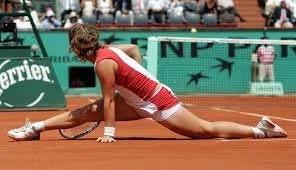The preceding post on post-match routines covered the reasons you need to take care of your mind and body after a match and how to replenish yourself. In this post, we go over your second recovery objective: to save your legs and conserve energy. Your priority should be to minimize stress on your legs. If they're stiff and tired during a match, you'll feel slow like there's lead inside. But you want them light and fast so you can get to any ball.
Standing consumes energy and fatigues your legs. You need to take care of physical recovery with exercises and stretching, explained here. Otherwise, you should stay off your feet whenever you can.
Take off your tennis shoes when you don't need them. Tennis shoes are heavy and stiff compared to running shoes or slippers.
Elevate your legs to reduce the heaviness you feel from leg fatigue. The research is not conclusive as to the benefits, but you will feel a difference after spending 10 to 30 minutes. Taking pressure off your legs will reduce swelling and add to the resting component.
Get some alone time where you're doing nothing. Chatting and socializing constantly is fun but takes up energy as well. You need to listen and pay attention to other people, which takes up resources. You don't need to completely isolate yourself, but try to find at least 30 minutes where you're relaxing.
Minimize stress. When you're stressed, your brain will release adrenaline and cortisol, and your muscles will get tense. The key to addressing stress is to avoid things you know will stress you. But the best method is to work on mindfulness so fewer things outside your control will stress you out. In a state of mindfulness, you're not judgmental about things that happen. Mindfulness is also an important skill to use during a tennis match.
Practice breathing deeply. Shallow breathing causes stress and slows recovery. There are also negative long-term effects from shallow breathing. Deep breathing improves your oxygen intake, makes it easier to relax, and will help you focus.
Resting, hydrating, and eating well do not complete proper recovery. You must also help your body recover with light exercises and stretching. More on that here.
At competitive events, you want to be at your top physical and mental state so you can perform your best. Part of your top performance is accomplished by proper maintenance during the tournament. A good post-match routine is critical to your well-being and your ability to play your best the following day. Your routine must help you recover your mental, physical, nutritional, and emotional states. The goal is to recuperate well enough to be mentally and physically energetic and to feel good about moving your body and paying attention to the ball.




